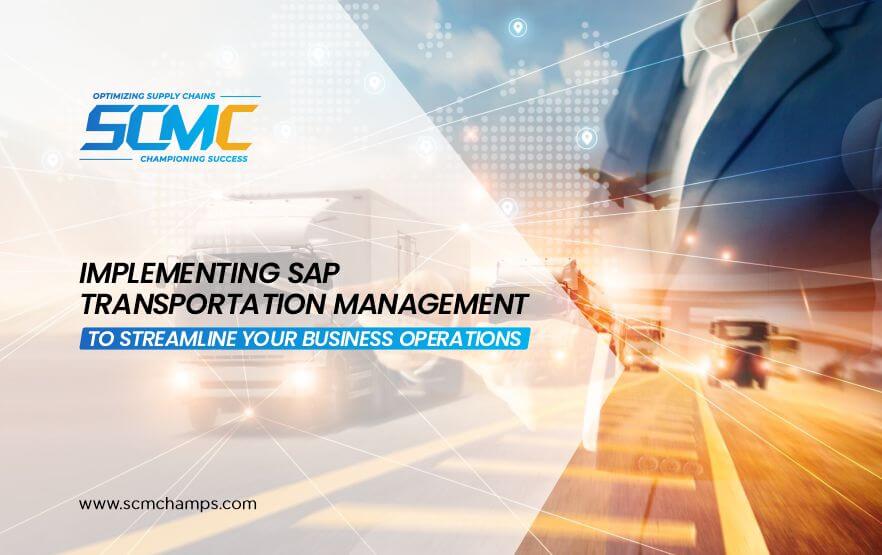
In today’s competitive and globalized business environment, managing multinational businesses has become challenging. Organizations require a global transportation management solution (TMS) to streamline their operations.
However, selecting and implementing a global TMS system is not an easy task, as the solution needs to support current as-is processes and be adaptive enough for future improvement opportunities. A TMS system should provide various functionalities and flexibility to run a variety of transportation scenarios within the same instance. In addition, integration capabilities are critical from both an IT and business perspective.
Here are Some Options to Deploy SAP TM That Can Help Organizations Achieve Their Business Objectives:
1. Seamless Integration With SAP Standard Systems
SAP TM effortlessly integrates with standard SAP systems such as SAP ECC, SAP EWM, SAP BW, and SAP GTS. When it comes to integrating transactional data between SAP ECC and SAP TM, reliable messaging approaches or the utilization of the SAP Process Integration (PI) system can be employed. The SAP PI middleware plays a crucial role in integrating multiple SAP ECC instances with a centralized SAP TM instance, ensuring smooth and efficient data flow.
2. Integrating Multiple SAP ECC Systems
For large multinational corporations that have separate instances of the SAP ECC system for each business unit or division, it is possible to connect all these multiple SAP ECC systems to the same SAP TM platform in multiple ways. SAP PI system can be used to route transactional data to the correct source ECC system. Using multiple SAP PI systems or SAP TM as middleware can also be considered for integration, based on the enhancement pack level or release of the SAP ECC system.
3. Integrating With Non-SAP Legacy Systems
Integration options to SAP TM would be the same for shippers and logistic service providers that do not run on SAP or use legacy OLTP or CRM systems. Most of the custom development activities would be restricted to the source system, ensuring that the integration from the SAP TM standpoint remains fairly standard.
4. Deploying SAP TM as an Independent System
SAP TM can be implemented as a standalone system, functioning autonomously without the need for integration with other legacy systems. It effectively manages all transportation-related business functions, encompassing order management, transportation planning, carrier selection, rating, and financial settlement.
To import order-related information into the SAP TM system, EDI or RFC calls can be utilized to generate transportation requirements within the system. Similarly, for sending freight settlement and financial data to external systems, be it through EDI/RFC or standard web services, SAP TM offers seamless interoperability.
Overall, organizations have several options for deploying SAP TM based on their specific business needs and IT setup. Deploying SAP TM can help organizations streamline their operations and improve their bottom line.
Streamlining Master Data Integration With SAP Transportation Management
Master data integration plays a key role in the effective functioning of the system. In this article, we take a closer look at how SAP Transportation Management provides a complete infrastructure for master data management and integration with SAP ECC. Discover seamless integration opportunities that provide enhanced system functionality and data consistency across your organization.
1. Analyzing Source Systems
When managing master data from multiple source systems, it is crucial to conduct a thorough analysis of each system’s current state. This analysis helps identify and address any potential overlaps in master data elements and specific naming conventions that require attention.
2. SAP TM Infrastructure:
As part of SAP Transportation Management, a comprehensive infrastructure is provided that enables the management of master data and seamless integration with SAP ECC, commonly referred to as the supply chain management foundation.
This integration enables the harmonization of enterprise data and ensures a synchronized flow of information. In addition, SAP provides a robust framework that enables companies to efficiently create, extend, customize, and modify inbound master data across multiple supply chain solutions within the SAP Business Suite.
3. Identifying Source Systems
Most master data objects in the SAP TM system have fields that can be used to identify which source system the object was received from. For example, on the business partner entities in SAP TM, the responsible institution field tells you which source system the Business Partner was created from and under which role.
4. Flexibility in Mapping Master Data Sources
The Identification tab within the business partner feature can be utilized to map the same business partner master data to different master data sources, whether received from a legacy system or SAP ECC. Similarly, other master data objects such as organizational structure, materials, and locations contain unique fields that enable differentiation.
5. SAP TM for Global-Scale Operations
For organizations seeking to revolutionize their supply chain processes and IT infrastructure, transportation and logistics play a vital role. SAP Transportation Management provides a comprehensive solution that empowers organizations to operate on a global scale, ensuring seamless integration across all systems.
6. Benefit-Driven Implementation Approach
SCM Champs Inc. offers an exceptional Benefit-Driven Implementation approach, based on the understanding that vision, infrastructure dependencies, process design, and scenario development shape the structure of any supply chain IT innovation investment. Their experienced consulting team leverages their expertise in SAP Transportation Management to define the ideal first step, proof of concept, project, or roadmap.
Conclusion:
In conclusion, Master data integration is essential for the system to function properly. Businesses can use SAP Transportation Management’s pre-built framework to efficiently manage and integrate master data with SAP ECC. By providing flexible global system integration, SCM Champs Inc’s benefit-driven implementation approach can help organizations get the most out of SAP Transportation Management.


